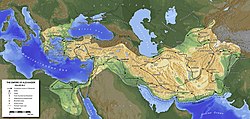
Back Lamischer Krieg ALS الحرب اللمومية Arabic Ламийска война Bulgarian Lamijski rat BS Guerra de Làmia Catalan Lamijská válka Czech Lamischer Krieg German Λαμιακός Πόλεμος Greek Guerra lamiaca Spanish Lamian sota Finnish
| Lamian War | |||||||
|---|---|---|---|---|---|---|---|
 | |||||||
| |||||||
| Belligerents | |||||||
|
Athens Aetolian League Thessalian League Phokis |
Macedonia Boeotia Euboea | ||||||
| Commanders and leaders | |||||||
|
Leosthenes † Antiphilos Menon Euetion Phokion |
Antipatros Leonnatos † Krateros Kleitos Polyperchon | ||||||
The Lamian War, or the Hellenic War, (323–322 BC) was an unsuccessful attempt by Athens and a large coalition of Greek states to end the hegemony of Macedonia over Greece just after the death of Alexander the Great. It was the last time Athens played a significant role as an independent power.
War was simmering in Greece after Alexander the Great issued the Exiles' Decree (in 324 BC), which ordered the Greek states to return all the people they had forced into exile. This decree meant that Athens had to surrender the island of Samos, colonised by Athenian clerurchs since 365 BC, while the Aetolian League had to leave Oiniadai, taken c.330 BC. Once the death of Alexander became known in June 323 BC, most states in mainland Greece revolted and founded the Hellenic League, recalling the alliance forged during the Persian Wars; this time with Macedonia in the role of the foreign invader. The Greeks were initially successful under their Athenian commander in chief Leosthenes, who managed to besiege Antipater, the Macedonian general in Europe, in the city of Lamia, which gave its name to the war. At this point however, the arrival of a large Macedonian fleet commanded by Cleitus the White from the Levant turned the tide in favour of Macedonia. Even though Athens had more ships than Macedonia, it did not have enough crews to man them all and its overextended navy was defeated off the Echinades island and Amorgos.
On land, the Greeks lifted the siege of Lamia with the arrival of Macedonian reinforcements from Asia. At the head of a large merged army, Antipater defeated the Greeks in Thessaly at the battle of Krannon, after which he received the surrender of every city state in central Greece. Faced with the prospect of a naval blockade and a land invasion, Athens capitulated. It had to give up its navy, host a Macedonian garrison on its soil, lose its possessions outside Attica, and even trade its democracy for an oligarchic regime. As a symbol of the event, the famous orator Demosthenes committed suicide to avoid his capture by the Macedonians. Athens never played a leading role again in Greece after the Lamian War.
While Antipater was turning his forces west to deal with the Aetolian League, the last member of the Greek alliance still fighting, he was called back to Asia by the beginning of the Wars of the Diadochi between Alexander's generals. The Aetolian League therefore escaped unscathed and appear to be the real winner of the war, because Athens bore most of the fight, and the league remained mostly in place. The Aetolian League then became one of the most important states in Greece during the Hellenistic era.